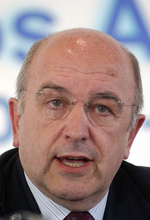European regulators are getting the hang of levying pay-for-delay penalties, rolling up 6 companies in its latest action and fining them more than half a billion dollars in the process. Europe's third action in about a year focuses on France's Servier but ropes in 5 others including Teva Pharmaceutical Industries and Mylan, accusing them of accepting payoffs to delay generics of a top-selling Servier drug.
 |
| Joaquin Almunia |
"Servier had a strategy to systematically buy out any competitive threats to make sure that they stayed out of the market," EU Competition Commissioner Joaquin Almunia told Bloomberg in a statement. "Competitors cannot agree to share markets or market rents instead of competing, even when these agreements are in the form of patent settlements."
In July 2012, the European Commission charged Servier, along with Teva ($TEVA), Unichem and a subsidiary, Slovenia's largest drugmaker Krka, Lupin and Matrix, which is now part of Mylan ($MYL), for working out deals that it believes kept generics of Servier's blood pressure drug perindopril off the market and costing consumers significant money.
The fines today total €427.7 million ($582.2 million), with Servier taking the biggest hit, €331 million ($450 million), Bloomberg reported. Lupin was fined €40 million, Mylan €17.2 million, Teva €15.6 million, Krka €10 million, and Unichem Laboratories and a subsidiary €14 million.
Pay-for-delay litigation has been going on in the U.S. for some years. Europe took up the issue with an investigation in 2008 that didn't result in any action until last year but has been rolling out fines in short order since. In June 2013 it levied fines totaling €146 million ($195.5 million) against Denmark's Lundbeck, Merck KGaA and some other drugmakers for holding up generics of its blockbuster antidepressant, Celexa. Then in December they hit Johnson & Johnson ($JNJ) and Novartis ($NVS) with fines of €16.3 million, or about $22 million, for keeping a generic version of a powerful painkiller off the market.
Drugmakers in Europe and the U.S. argue that settling patent litigation under specific terms is a way to set aside uncertain and costly lawsuits. They contend it does not keep generics off the market any longer than their patents would have. A deal in 2006 between Servier and Krka, allowed the Slovenian drugmaker to sell a generic in some Eastern European countries but not in the U.K. The company said it believed it had a right to avoid the risks of litigation and had no "duty to take an action to revoke the patent granted by the European patent authorities."
But European regulators are not buying the arguments, saying it is costing consumers, and so government budgets, significant sums. In the Lundbeck case, they say that keeping generics of citalopram off the market kept prices artificially high. Prices for the drug dropped by 90% when generics finally came to market.
- read the Bloomberg story